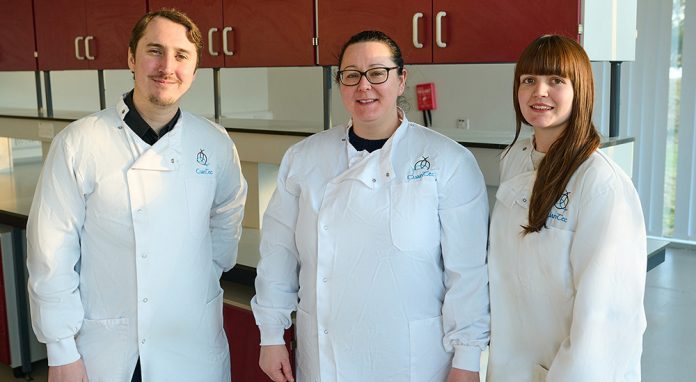A Scottish firm is using shellfish waste as a base material for plastic-free food packaging.
Blue biotech CuanTec has developed a unique method to extract chitin – a naturally occurring polymer – from discarded langoustine shells.
Working with sustainable packaging designer and manufacturer Colpac, their prototype uses ‘CuanSaveTM’ fully biodegradable film in a food window box suitable for paper recycling. This type of packaging has never been commercially available before.
By using shellfish waste that would otherwise be incinerated to extract chitin, the technology provides the purest grade chitin available globally. It is suitable for a wide range of uses in pharmaceuticals, cosmetics and food.
Shellfish – as with other waste – is either dumped in landfill or incinerated, creating thousands of tonnes of damaging carbon emissions.
CuanTec’s technology produces no emissions and toxic byproducts, and the packaging’s antimicrobial properties help extend the shelf life of the food it is wrapped in.
The company’s new factory is set to open in Glenrothes in the summer, with the product currently being trialled and commissioned in readiness to enter the market by the end of 2023.
CuanTec’s technology also biologically separates proteins, minerals and lipids from shellfish waste, mushrooms and insect exoskeletons.
Their innovation as an SME has been recognised with EU grant support from the Co-Innovate programme.
The scheme, was launched in 2017 to increase the number of businesses collaborating with partners in other regions, encourage innovation, and help ambitious SMEs grow.
Over 1,400 companies in Western Scotland, Northern Ireland and the border region of Ireland have been supported to date.
Co-Innovate helped fund a CuanTec-led project to make the product commercially viable through pilot scale processes, in partnership with Irish company Versatile Packaging.
Tracy White, Scientific Manager at CuanTec, said:“Our vision is to make plastic pollution history through the development of novel bioplastics that can directly replace single-use petroleum plastics. Support from the Co-Innovate programme has been instrumental to making this vision a reality as we work with partners in Scotland, Northern Ireland and Ireland to develop our processes and make this revolutionary technology commercially ready.
“We are continuing the work with our consortium partners, collaborating to refine the scaled-up process and improve the quality of the end product, which we are confident will be on shelves in the near future.”



